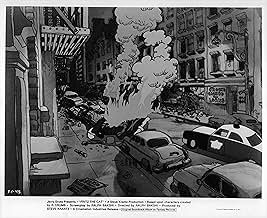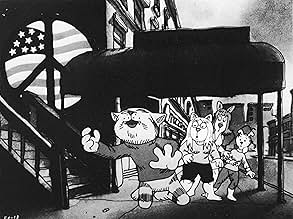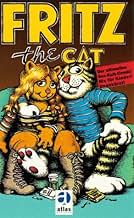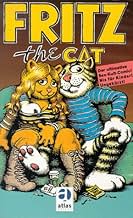CALIFICACIÓN DE IMDb
6.2/10
15 k
TU CALIFICACIÓN
Ambientada en los barrios populares de Nueva York. La historia se desarrolla en la década de los 60, gira alrededor de un gato pervertido en su búsqueda del amor en los lugares menos indicad... Leer todoAmbientada en los barrios populares de Nueva York. La historia se desarrolla en la década de los 60, gira alrededor de un gato pervertido en su búsqueda del amor en los lugares menos indicados.Ambientada en los barrios populares de Nueva York. La historia se desarrolla en la década de los 60, gira alrededor de un gato pervertido en su búsqueda del amor en los lugares menos indicados.
- Dirección
- Guionistas
- Elenco
Rosetta LeNoire
- Bertha
- (voz)
- …
John McCurry
- Blue
- (voz)
- …
Ralph Bakshi
- Narrator
- (voz)
- (sin créditos)
- …
Charles Spidar
- Bar Patron
- (voz)
- (sin créditos)
- …
- Dirección
- Guionistas
- Todo el elenco y el equipo
- Producción, taquilla y más en IMDbPro
Opiniones destacadas
That is how the 1960s were described by the narrator in the beginning of this film. Fritz the Cat is a famous movie for a number of reasons, most stemming from it being the first feature-length adult cartoon and having an "X" rating. There were controversies surrounding its creation with director Ralph Bakshi and character creator Robert Crumb. The film is like nothing I have ever seen before. It has a unique animation process that makes everything reek seediness, despair, and cry for social change. Bakshi wrote the script which really is nothing more than the knife that cuts through all the 60's BS - from existentialism to the drug culture to the love generation to African-American perspectives to militancy. Nothing is spared as the counterculture is laid bared and examined through the eyes, ears, fears, and desires of Fritz the Cat. Along the way, Fritz experiments with just about anything - including lots of sex, drugs, and sex. While the film definitely is quite vulgar in many ways with some of the most odious characterizations of otherwise cute and cuddly animals and depicting lots of strong sexual situations(though in no way deserving the "X" by today's standards), Fritz the Cat is also an intelligent look at one character's drive to find himself and meaning in his life - perhaps a symbol for the whole decade the film is examining. The end result is nothing conclusive - also perhaps a symbol. Bakshi's script is in some ways profound and thought-provoking and in some ways infantile and vile - his obvious dislike of police just one example. But what had my attention more than anything else was the animation - particularly in exterior shots not containing characters. There is one scene where the slums of Harlem are integral to the story. Bakshi uses his camera to zoom in on quite an impressive animated background shot of a field lost amongst the slums of Harlem. It is the very essence of seedy existence in an uncaring world. There are many other shots too that have that same power, but let's not forget that even with the intelligent at times script and the animation, much of Fritz the Cat is used solely to arouse - either arouse some primal feelings or arouse offense. A landmark film at any rate whether for good or for bad.
From what I had heard of this film and the other user comments posted, I was expecting a simple little shock cartoon. What I got was good kick in the pants. And I mean that in a good way. "Fritz the Cat" in many ways exposes the 1960's more than the live action films of its own decade.
The movie starts with 3 construction workers talking on top of an unfinished building. The dialogue is very spontaneous and almost seems ad-libbed. These types of conversations are sprinkled throughout the 80 minute film.
It then transitions to Fritz the cat, a college student who, like many of that era I'm sure, is not sure what it's all for. He decides to "do something real" and ventures into Harlem. From here he meets a wide assortment of people, incites a riot, and has sex with many a woman. It may not always have a point, but the movie has one fun segment after another with little breathing room. Sometimes unnecessarily shocking, sometimes surprisingly inspired, but always quick on its feet.
So please give it a chance. It's a lot more than the notorious cartoon porn it's been labeled as. It's a fun romp through the deprived New York of the 60's, except this time with cartoon characters! What's not to like?
7/10
The movie starts with 3 construction workers talking on top of an unfinished building. The dialogue is very spontaneous and almost seems ad-libbed. These types of conversations are sprinkled throughout the 80 minute film.
It then transitions to Fritz the cat, a college student who, like many of that era I'm sure, is not sure what it's all for. He decides to "do something real" and ventures into Harlem. From here he meets a wide assortment of people, incites a riot, and has sex with many a woman. It may not always have a point, but the movie has one fun segment after another with little breathing room. Sometimes unnecessarily shocking, sometimes surprisingly inspired, but always quick on its feet.
So please give it a chance. It's a lot more than the notorious cartoon porn it's been labeled as. It's a fun romp through the deprived New York of the 60's, except this time with cartoon characters! What's not to like?
7/10
The bad thing about the past is that it is designed to fool you.
The idea is supposed to be that the past stays fixed, as a sort of "truth." And we change. But viewed from ourselves, often the illusion or even the truth is the reverse. We know who we are. We think we recall who we were -- which we envision is some state on the way to who we are. Something relatively static, which means that the past changes. Radically.
Or at least artifacts from the past change, artifacts like movies. All this is complicated by the fact that movies are a key tool we use to define ourselves.
So it is a strange trip indeed to encounter something that DID define us, that we allowed to tell us who we were. And to find it so vacuous, so superficial it shocks.
If you were not a hippie in that era you may need to know the great schisms at work. (I mean the era depicted here -- 1969 -- not the actual date of the movie.)
You had the east coast hippies who were the sons and daughters of the beat generation. We were interested in ideas and art, and life as both. You had the "political" hippies, who were motivated by unhappiness and determined to change what they didn't like in the name of the values of more "genuine" hippies.
And then you had the west coast hippies. These were the ones captured by drugs, "free" sex and dropping out. To differentiate themselves, they adopted the icons of death.
At the time, there was as much confusion among these three as between any one of them and the Nixonites. (This was in the days of the "moral majority" and before the rise of the religious right which evolved from it.)
And where there is is identity confusion, art rushes in. The Beatles of course, and central. Eastern "religions."
And R Crumb.
Crumb was a magnet, pulling many from the other camps into the west coast sphere. He made it seem less radical than it was -- more about cruising (which he called "truckin") and simply enjoying the cornucopia of round women God places there only for pleasure.
We bought it, all of us. It was a sort of commercial identity, sort of like what you see today that surrounds Valentine's day. A vague notion of self and others and satisfied living.
Now, we look at this and it seems the past has moved away from us, away from truth. Was this ever good, or did we only pretend it so because we were so hungry to be defined?
I recently saw a Mickey Rooney movie where he introduces himself to Judy Garland as "white, free and available." I recoiled. I rejected that past. I had nearly the same feeling when watching this, even though it is/was my past.
Ted's Evaluation -- 1 of 3: You can find something better to do with this part of your life.
The idea is supposed to be that the past stays fixed, as a sort of "truth." And we change. But viewed from ourselves, often the illusion or even the truth is the reverse. We know who we are. We think we recall who we were -- which we envision is some state on the way to who we are. Something relatively static, which means that the past changes. Radically.
Or at least artifacts from the past change, artifacts like movies. All this is complicated by the fact that movies are a key tool we use to define ourselves.
So it is a strange trip indeed to encounter something that DID define us, that we allowed to tell us who we were. And to find it so vacuous, so superficial it shocks.
If you were not a hippie in that era you may need to know the great schisms at work. (I mean the era depicted here -- 1969 -- not the actual date of the movie.)
You had the east coast hippies who were the sons and daughters of the beat generation. We were interested in ideas and art, and life as both. You had the "political" hippies, who were motivated by unhappiness and determined to change what they didn't like in the name of the values of more "genuine" hippies.
And then you had the west coast hippies. These were the ones captured by drugs, "free" sex and dropping out. To differentiate themselves, they adopted the icons of death.
At the time, there was as much confusion among these three as between any one of them and the Nixonites. (This was in the days of the "moral majority" and before the rise of the religious right which evolved from it.)
And where there is is identity confusion, art rushes in. The Beatles of course, and central. Eastern "religions."
And R Crumb.
Crumb was a magnet, pulling many from the other camps into the west coast sphere. He made it seem less radical than it was -- more about cruising (which he called "truckin") and simply enjoying the cornucopia of round women God places there only for pleasure.
We bought it, all of us. It was a sort of commercial identity, sort of like what you see today that surrounds Valentine's day. A vague notion of self and others and satisfied living.
Now, we look at this and it seems the past has moved away from us, away from truth. Was this ever good, or did we only pretend it so because we were so hungry to be defined?
I recently saw a Mickey Rooney movie where he introduces himself to Judy Garland as "white, free and available." I recoiled. I rejected that past. I had nearly the same feeling when watching this, even though it is/was my past.
Ted's Evaluation -- 1 of 3: You can find something better to do with this part of your life.
I came across the recently released DVD of this film in, of all places, the children's video section of Virgin Megastore. Whether or not this poorly miscategorized placement was of simple ignorance or whether the intent weas subversive and it was intentionally and deliberately placed in the children's section, I found myself grinning and reluctant inform anyone of the error. After all, nobody gave me any forewarnings when I was a kid either, as some things you just have to discover on your own, and the thought of some poor innocent parents popping this film on for their kid only to look on in horror at the visions that would soon unfold sounded dastardly and funny indeed.
I was 7 years old when Fritz the Cat first hit the screen, and while I didn't see the film for the first time until I was well into my twenties, the film nevertheless had a lasting impact on my childhood. This film had taken on a reputation of mythical proportions in my Brooklyn hometown neighborhood, partly due to the older teens on my street who were all too eager to share shocking details contained therein, as only the best subversive intentions can do, and further securing the film's status as "every parent's nightmare". To a child about to undergo serious growing pains and a naturally growing curiosity towards all things "adult-related", Fritz the Cat was very much my earliest childhood memory of the themes of sex, drugs, rock-n-roll, racism, you name it, and it was a symbol for naughtiness that all coming of age kids couldn't wait to catch a sneak peak of, or at least couldn't wait to reach the age when we could view such subject matter freely.
As a movie, it hasn't lost any of it's impact in 30 years, and fewer films truly capture the grittiness and raw edge of New York city in the 70's (French Connection is another good example). I dare say that it could be considered more offensive now than ever, as I fear that today many just might not "get it," despite our self-proclamation that we've come a long way in maturity and tolerance of such sensitive issues. Modern society has become so politically correct and desensitized to controversial issues that we're less tolerant and understanding of the original intent of a film such as this, especially when it's messages are not consistent with our modern value system. Thus, some of the obvious stereotypes presented in this film (such as the pigs portraying cops and the crows portraying blacks, for example), could never be presented in a film today. Granted, these images were meant to be offensive in the 70's as well, but they were obviously taken in a different light back then, as they were indicative of a specific brand of biting satire found in the 70's and hippie culture and a reflection of how that particular generation could openly address such social issues. These issues, such as racism, are clearly still relevant today, we just address them in a different manner, which is why Fritz the Cat still has potency yet is more or less looked upon as a curious time capsule of a bygone era today.
I was 7 years old when Fritz the Cat first hit the screen, and while I didn't see the film for the first time until I was well into my twenties, the film nevertheless had a lasting impact on my childhood. This film had taken on a reputation of mythical proportions in my Brooklyn hometown neighborhood, partly due to the older teens on my street who were all too eager to share shocking details contained therein, as only the best subversive intentions can do, and further securing the film's status as "every parent's nightmare". To a child about to undergo serious growing pains and a naturally growing curiosity towards all things "adult-related", Fritz the Cat was very much my earliest childhood memory of the themes of sex, drugs, rock-n-roll, racism, you name it, and it was a symbol for naughtiness that all coming of age kids couldn't wait to catch a sneak peak of, or at least couldn't wait to reach the age when we could view such subject matter freely.
As a movie, it hasn't lost any of it's impact in 30 years, and fewer films truly capture the grittiness and raw edge of New York city in the 70's (French Connection is another good example). I dare say that it could be considered more offensive now than ever, as I fear that today many just might not "get it," despite our self-proclamation that we've come a long way in maturity and tolerance of such sensitive issues. Modern society has become so politically correct and desensitized to controversial issues that we're less tolerant and understanding of the original intent of a film such as this, especially when it's messages are not consistent with our modern value system. Thus, some of the obvious stereotypes presented in this film (such as the pigs portraying cops and the crows portraying blacks, for example), could never be presented in a film today. Granted, these images were meant to be offensive in the 70's as well, but they were obviously taken in a different light back then, as they were indicative of a specific brand of biting satire found in the 70's and hippie culture and a reflection of how that particular generation could openly address such social issues. These issues, such as racism, are clearly still relevant today, we just address them in a different manner, which is why Fritz the Cat still has potency yet is more or less looked upon as a curious time capsule of a bygone era today.
The idea of taking certain concepts to the extreme has been happening forever and it's no stranger to the film industry. Originally, the thought of making animated movies was scoffed at, until Disney made theirs. Then as time progressed, people began to treat animated features with more relevance towards adults. However, it wasn't until the experimental era of rock, fornication and drugs did that particular push come into play. Classic cartoons that came before the 1950s were considered for adults, but they didn't contain blatant drug abuse and graphic sexual content. That is until Ralph Bakshi became one of those pioneers of said genre. Having worked on several other animated projects prior, Bakshi was very familiar with this aspect of filmmaking, which led him to his feature film directorial debut.
Fritz the Cat (1972) is Bakshi's satirical take and social commentary on the 1960's in the United States. Plot wise, it follows the adventures of Fritz the cat (Skip Hinnant) looking to fine the "inner meaning" to life and such. Being a college student, he floats around hopping to different places and experiencing different kinds of people with their ideologies. Also written by Bakshi, the script finds itself bogged down with a hodgepodge of events and underdeveloped motives for the audiences' "protagonist". It's rather unfortunate because the film itself isn't meant to really make Fritz a likable character, but the film also partially fails to provide any sort of understanding as to why he acts the way he acts. It's just Fritz being hypocritical doing things with different people; which was already spoiled in the plot synopsis.
In a way, it feels like Bakshi's version of Alice in Wonderland but grittier and graphic. The audience bumbles along with Fritz on his misadventures watching him try to fit in with all sorts of individuals that in no way fit him. Worst yet, is that Fritz himself feels weightless in his motivations. He just keeps searching, and searching, not really getting to a definitive state of understanding. Fritz is a lost puppy....how oxymoronic. Along his travels, Fritz tries drugs, fornicates with whatever character he finds appealing that he can woo over, joins extremely dangerous cults and causes tensions between different groups of people. All to find that "inner meaning" he so desperately wants to understand. In some ways, it feels like what some of the 1960s were about, but was it that chaotic and scatterbrained?
The acting is fine despite the cast being a very short list. Skip Hinnant as Fritz is fine, he gets the job done adequately. He didn't perform very much after this, returning for The Nine Lives of Fritz the Cat (1974) and I Go Pogo (1980). Rosetta LeNoire also plays the role of Bertha in this film. She does fine for the role while also voicing other characters too. LeNoire would later have roles in The Brother from Another Planet (1984), Gimme a Break! and Family Matters. There are some other actors involved in this production, but their contribution is so little in comparison and they didn't go on to do much later, so it's not worth covering. If there's one thing Bakshi got right, it was making this cartoon directed towards adults because no youth should see the amount of graphic nudity and violence that is in this picture. There's blood, private parts and racial undertones that would not be accepted at all today by any means.
As for the visual aspects, it's a little confusing as to why two cinematographers were needed as this was an animated film. There are some settings where the picture gets rotated but I'm not sure if camerawork was needed for that. As for the animation itself, the colors and movements to the characters are good. The textures to the animation are unique too since it was most likely cell animation. The coloring in every stage of the animation looks like no frame was filled in exactly the same. It's a different look for sure. Lastly the music composed by Ed Bogas was okay for the time and budget it was produced on. Bogas would also go on to compose for The Charlie Brown and Snoopy Show and Garfield and Friends. He would also go onto compose music for video games like Gameboy's Swamp Thing and even the dreaded NES Action 52 cartridge. Very interesting indeed.
As a whole, the movie should be looked at more as a trial in pushing the limits of acceptable animated films. Sadly, this movie tries to make a point but doesn't. The animation, music, social commentary and acting are okay, but the point of it is lost with its haphazard story, overly graphic detail and half-baked script.
Fritz the Cat (1972) is Bakshi's satirical take and social commentary on the 1960's in the United States. Plot wise, it follows the adventures of Fritz the cat (Skip Hinnant) looking to fine the "inner meaning" to life and such. Being a college student, he floats around hopping to different places and experiencing different kinds of people with their ideologies. Also written by Bakshi, the script finds itself bogged down with a hodgepodge of events and underdeveloped motives for the audiences' "protagonist". It's rather unfortunate because the film itself isn't meant to really make Fritz a likable character, but the film also partially fails to provide any sort of understanding as to why he acts the way he acts. It's just Fritz being hypocritical doing things with different people; which was already spoiled in the plot synopsis.
In a way, it feels like Bakshi's version of Alice in Wonderland but grittier and graphic. The audience bumbles along with Fritz on his misadventures watching him try to fit in with all sorts of individuals that in no way fit him. Worst yet, is that Fritz himself feels weightless in his motivations. He just keeps searching, and searching, not really getting to a definitive state of understanding. Fritz is a lost puppy....how oxymoronic. Along his travels, Fritz tries drugs, fornicates with whatever character he finds appealing that he can woo over, joins extremely dangerous cults and causes tensions between different groups of people. All to find that "inner meaning" he so desperately wants to understand. In some ways, it feels like what some of the 1960s were about, but was it that chaotic and scatterbrained?
The acting is fine despite the cast being a very short list. Skip Hinnant as Fritz is fine, he gets the job done adequately. He didn't perform very much after this, returning for The Nine Lives of Fritz the Cat (1974) and I Go Pogo (1980). Rosetta LeNoire also plays the role of Bertha in this film. She does fine for the role while also voicing other characters too. LeNoire would later have roles in The Brother from Another Planet (1984), Gimme a Break! and Family Matters. There are some other actors involved in this production, but their contribution is so little in comparison and they didn't go on to do much later, so it's not worth covering. If there's one thing Bakshi got right, it was making this cartoon directed towards adults because no youth should see the amount of graphic nudity and violence that is in this picture. There's blood, private parts and racial undertones that would not be accepted at all today by any means.
As for the visual aspects, it's a little confusing as to why two cinematographers were needed as this was an animated film. There are some settings where the picture gets rotated but I'm not sure if camerawork was needed for that. As for the animation itself, the colors and movements to the characters are good. The textures to the animation are unique too since it was most likely cell animation. The coloring in every stage of the animation looks like no frame was filled in exactly the same. It's a different look for sure. Lastly the music composed by Ed Bogas was okay for the time and budget it was produced on. Bogas would also go on to compose for The Charlie Brown and Snoopy Show and Garfield and Friends. He would also go onto compose music for video games like Gameboy's Swamp Thing and even the dreaded NES Action 52 cartridge. Very interesting indeed.
As a whole, the movie should be looked at more as a trial in pushing the limits of acceptable animated films. Sadly, this movie tries to make a point but doesn't. The animation, music, social commentary and acting are okay, but the point of it is lost with its haphazard story, overly graphic detail and half-baked script.
¿Sabías que…?
- TriviaThere is no evidence that Robert Crumb filed suit to have his name removed from the film's credits. Contradictory to this claim, Crumb's name continues to appear in the credits, even on home media releases. His name, however, does not appear in the credits for Las nueve vidas eróticas del gato Fritz (1974).
- ErroresWhen he emerges from the trash can, Fritz's outfit changes color from red to blue to red again between shots.
- Versiones alternativasWhen aired during the Groundbreakers block on Playboy, the scene of Harriet's rape is heavily edited. The movie is otherwise uncut.
- ConexionesFeatured in Precious Images (1986)
Selecciones populares
Inicia sesión para calificar y agrega a la lista de videos para obtener recomendaciones personalizadas
- How long is Fritz the Cat?Con tecnología de Alexa
Detalles
Taquilla
- Presupuesto
- USD 700,000 (estimado)
- Tiempo de ejecución1 hora 18 minutos
- Color
Contribuir a esta página
Sugiere una edición o agrega el contenido que falta

Principales brechas de datos
What is the French language plot outline for Fritz el gato (1972)?
Responda
























